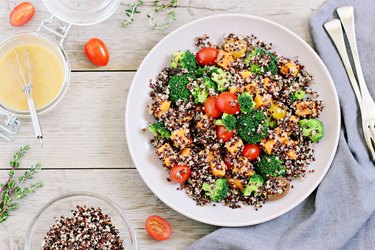
If you wake up in a panic because your belly is a little puffier than it was yesterday, you're not alone. Millions of people experience daily bloating due to poor dietary and lifestyle choices from days prior and wind up donning stretchy pants in lieu of skinny jeans.
Read more: 10 Surprising Flat-Belly Foods
Video of the Day
Video of the Day
In fact, according to a 2014 article in the journal Gastroenterology & Hepatology, it's one of the most common gastrointestinal complaints. While it may feel like an overnight 10-pound weight gain, gassiness and bloating can be corrected. Get your flat belly back with this all-day plan to beat the bloat.
Note: All these times are approximate to give you a starting point to schedule your day. Depending on how your day is structured, you can vary this schedule to match.

Start Your Day Off Right
6:30 AM: If you don't have any adverse reactions to caffeine, start the day with a cup of green tea. The National Institutes of Health advises that caffeine stimulates colonic activity.
So if your morning bloat is exacerbated by constipation, a caffeine-stimulated trip to the bathroom may be just what you need. Plus, green tea contains loads of antioxidants.
7:00 AM: It may be tempting to skip breakfast, but eating the right type of food first thing can help your gut start to shrink. Consider fruits high in potassium, such as cantaloupe, or the healthy fats of an avocado on a slice of whole-wheat bread.
Potassium may help remove excess sodium and extra fluid from the body. Staying consistent in eating habits can be a good way to help beat the bloat throughout the day. But don't increase the amount of fiber you would usually eat at meals — that could worsen your bloating.
7:30 AM: Start drinking water to flush out the bloat. It may seem counterintuitive to drink water to release water, but that's exactly what you should do! Dehydration can cause your body to retain water, so drink a glass now and carry a water bottle with you throughout the day.
And try mixing it up! A 2008 review article in the International Journal of Chemical Sciences indicated that fresh citrus juice aids in digestion. A big splash of lemon, lime or orange juice may not only help ease the uncomfortable feeling in your gut, but it may also help promote increased water intake.
8:00 AM: Get your sweat on! Research published in the American Journal of Gastroenterology concluded that exercise helped reduce the symptoms of bloating when excess gas is involved. In addition, exercise can help strengthen the abdominal muscles, leading to an overall tighter tummy.
9:30 AM: Eating smaller meals and including snacks throughout the day is a good way to avoid feeling uncomfortably full. Hydrate with water after your workout and grab a small post-workout snack.
A good choice would be a yogurt with live and active cultures, often referred to as probiotics. Researchers hypothesize that since bloating can occur when the microbiota in the gut is altered, probiotics can help regulate the function of the gut, according to a 2013 article in the Journal of Neurogastroenterology and Motility.

Plan Your Bloat-Free Afternoon
12:30 PM: A nourishing lunch will help you get a tummy that's just a little flatter with every hour. Ensure you're not eating any foods that don't agree with you, and avoid foods that can cause gassiness and bloating, such as broccoli, cauliflower, kale and cabbage.
Try eating a low-FODMAP (fermentable oligosaccharides, disaccharides, monosaccharides and polyols) diet. Originally designed for people with irritable bowel syndrome, the FODMAP diet cuts out foods thought to trigger uncomfortable gastrointestinal symptoms like bloating.
So opt for a quinoa salad with grilled chicken, cucumbers and tomatoes and a glass of lemon water. And give yourself time to eat slowly. Adding excess air, either by eating too fast or by sipping through straws, can exacerbate your belly bloat. You should also avoid carbonated beverages, smoking and chewing gum for the same reason.
2:30 PM: Find a way to de-stress. A 2014 article published in the World Journal of Gastroenterology indicated that there may be a link between mental stress and bloating.
Practicing good posture with slow breathing exercises or a short yoga class may help declutter your mind and reduce stress. And if you sit all day, maintaining good posture will help strengthen abdominal and back muscles leading to a slimmer midsection.
4:00 PM: When opting for an afternoon snack, skip the sugar-free foods, which often contain sugar alcohols and can cause digestive issues. It's best to stick with unsalted nuts, fresh fruit or carrots and hummus when looking for an afternoon snack.

End the Day in a Healthy Way
6:00 PM: If the bloated feeling is still lingering by dinnertime, take the salt shaker off the table and stash it in the cabinet. Excess sodium can lead to water retention. It will not only keep you bloated today, but it also may set you on track for more bloating tomorrow. Make dinner at home, use fresh ingredients and cut back on processed foods to keep the sodium level to a minimum.
7:30 PM: Grab your water bottle and head out the door for a walk. Walking can help stimulate the digestive tract to release the air bubbles and gas that continue to build up in your GI tract.
8:30 PM: Avoid eating within two hours of going to bed to give your food time to digest properly. If your stomach is still feeling full, drink a cup of decaffeinated hot tea, such as peppermint or chamomile.
10:30 PM: While there's little research to support specific sleep positions to relieve bloating, some individuals find it helpful to lie facedown to aid in releasing excess gas from their body and get back their flat stomachs for the next day.
What Do YOU Think?
Do you ever deal with bloating or other uncomfortable GI symptoms? What do you do? Do you change your diet or add in specific kinds of exercise? Have you followed any of the advice in this article? What else would you add? Share your thoughts, questions and suggestions in the comments below!
- Gastroenterology & Hepatology: Management Strategies for Abdominal Bloating and Distention.
- National Institutes of Health. Dietary Supplements for Weight Loss.
- International Journal of Chemical Sciences: Citrus Fruits: A Rich Source of Phytochemicals and their Roles in Human Health. A Review.
- American Journal of Gastroenterology: Physical Activity and Intestinal Gas Clearance in Patients with Bloating.
- Journal of Neurogastroenterology and Motility: Abdominal Bloating: Pathophysiology and Treatment.
- World Journal of Gastroenterology: Bloating and Functional Gastro-intestinal Disorders: Where are we and Where are we Going?